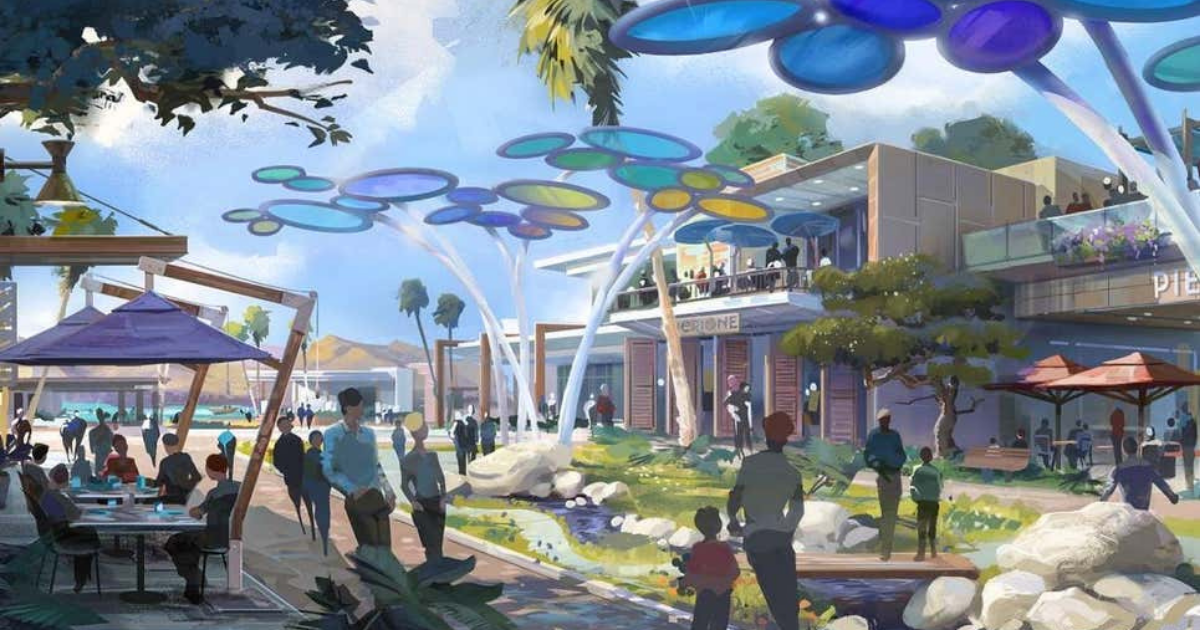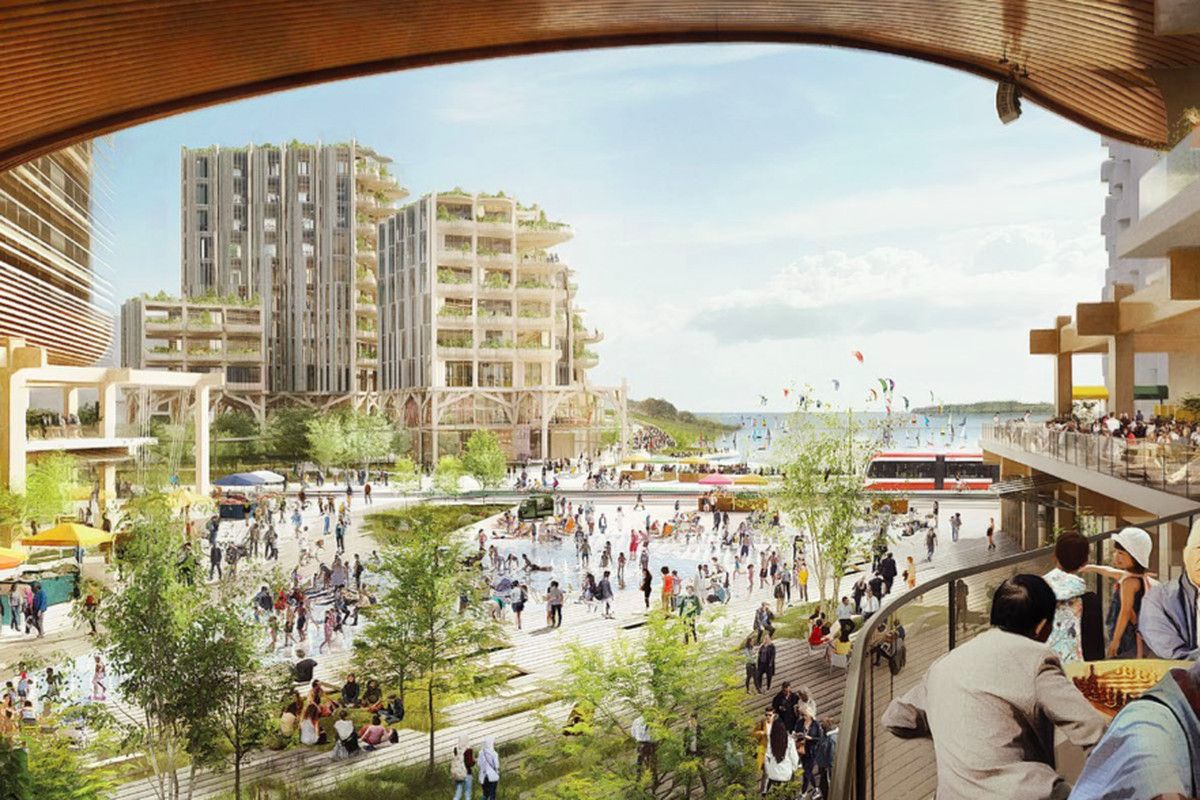Google's Smart City, Facebook's Metaverse and Disney's Storyliving

This a brief story tracking a particularly insidious encroachment in our public spaces. It gets grim in the middle, but ends in a positive note, I promise.
Part 1: Google and the Smart City - a story of surveillance capitalism

In 2017 the Google subsidiary Sidewalk Labs set out to develop a high-tech futuristic city on a stretch of industrial land along Toronto’s waterfront. It would be encompassing Google's very own vision of the "Smart City" with a million million sensors collecting massive amounts of data on everything imaginable. That was until Toronto's population rose in protest and the project was ditched. As it turns out, people are sceptical about the idea of living in a sandbox for surveillance capitalism. Should we, though?
Let's start with the naïve questions: can data collection actually solve our problems? And what kind of problems are we talking about here? Because none that I can think of, that relate to city living, can be solved by Google and, as I will try to make the case in this article, nor should they attempt it.
First and foremost, data collection is never a passive act. It is carried out with the specific purpose of influencing behaviour. I have to be very clear here: what Google does online, collecting data to sell to advertisers, would not work if the user behaviour could not be categorically and measurably modified. In fact, Google's own studies and marketing materials that cater to industry professionals are quite overt about the capability of determining user behaviour change.
The way the story was told in the last decades - the free internet is subsidized by advertising - is simply untrue. Or at least misleading by omission. Even a surface-level analysis shows that something is missing. Advertising can't pay for anything if it isn't generating revenue somewhere. Because if it could, we would all stop going to work and start watching ads 8 hours a day. The only way that I know of for the advertiser to generate revenue is by changing the user behaviour in a way that can be measured on the company bottom line. If marketing is about creating value by understanding (and exploiting) customer needs, then advertising is simply meant to influence purchasing behaviour.
But even if all of that data collection and subsequent advertising wouldn't be doing much influencing (which it unambiguously does), there is another insidious dimension to the practice. The term "data collection" sounds passive and innocent, perhaps "data mining" makes for a better term because it also doubles as the perfect metaphor - one only needs to briefly conjure images of environmental impact of mining and then substitute the natural environment with a sort of virtual commons. Data mining in advertising is directly associated with the worst of the web.
To understand this effect one can simply look at what happens when we replace the harmless "banner ad" with a made-up story created specifically to create division along political or ideological lines. It's the data mining that poisoned our discourse in much the same way chemicals used to extract precious metals from rocks leeched into our waterways.
You read it here first: data mining also produces toxic runoff. The latter is a price we're (unwittingly) willing to pay, as eager participants in capitalism, as long as it happens in a poorer country. With Social Media (more on this later) it happened right at home. This is what I call poetic justice.
To conclude this tangent, the "Smart City" is a leitmotif for "Data Collection", which in turn is just an euphemism for "Societal Control". Data collection doesn't happen without purpose or for its own sake. The reason one should be sceptical about Google being able to solve problems of city-living hinges on what kind of answer we prefer to the question "How will Google predict and modify our behaviour to address the problems associated with living in a modern city?" Personally I'm not too keen on Google attempting any of that sort. But even if you're partial to that kind of control, one has to admit: when corporate interest is at odds with individual liberty, it's the latter that's swiftly curtailed.
Part 2: Facebook and The Metaverse - the simulation and the simulacrum

Someone once told me that being a Conservative is nothing but nostalgia for a time that never existed. Which is fine, but let's call it what it is: idealism. This is perfectly fine at the level of political discourse - any political project is, in the most positive sense, wishful thinking.
So the question becomes - what is Zuckerberg attempting to (re)create? I'd argue it's a 3D copy of the Facebook Feed, which was originally a digital simulation of the public square. In postmodern terms, it's a simulacrum, a copy without an original that has the potential to forever and irreversibly sever our connection with a transcendental communal past. I understand that history is constantly being erased and rewritten retroactively, it's just that I don't want Zuckerberg to author it.
What happens when a corporation is attempting to re-create, in the digital space, our public spaces? Society is still paying the price of engaging with the Facebook Feed. I can't help but make the comparison with a sort of animal Feed that we are mindlessly stuffing our faces with. The Feed is a Soylent Green like witches brew, with bat wings and wolf hair floating about but with one key ingredient: human vitriol. It was supposed to be a virtual place where we go to see what our friends are up to and discuss the news. It was supposed to "bring people together" - according to their own company values. At least until very recently, as a new set of values were revealed with the Meta rebrand. Out with the old, in with the new.
What is the unfathomable fuckup of massive proportion is that a company created the exact literal opposite of what it set out to do. They wanted to connect people and instead divided them. And it was and still is rewarded for it.
The Facebook Feed didn't turn out as it was supposed to because in this process of virtualisation - the digital approximation of a world made from sticks and stones - some allowances had to be made for monetisation. And boy was it effective, to the tune of tens of billion dollars per year. What we ended up with was a far cry from "the public square". Or the type of public square that you avoid out of fear of getting stabbed.
This toxic "News Feed" that managed to turn brother against sister and son against mother is version 1 of the digitization (and implied privatisation) of our commons. Started out as an attempt to simulate different aspects of our collective engagement, without public oversight and scrutiny it turned out to be an embarrassing testament to human cruelty and divisiveness.
Now, here comes the Metaverse, version 2 of this dumpster fire. Excuse me for not being enthused. While Version 1 had its inspiration in the real world (at least in blueprint), the second version is a simulation of the first simulation. In other words, a simulacrum, a simulation of a thing that never really existed in the first place, except probably as a fever dream, brewed inside the mind of one of our most deluded billionaires. What can go wrong? Wait, it gets worse.
Once realised, this Metaverse will bring about entirely new forms of social relations (and control), which will bear no similarity to the old. This hyper-reality would be what Umberto Eco called "an authentic fake". Maybe if I would have been asleep for the last 15 years I could muster some excitement around the prospect. But what I can't forget (and where my up-beat pessimism stems from) is how the News Feed brought us Post Truth Politics (America), Social control (Turkey), Assassination of political dissidents (UAE), Manufactured consent (UK) and Genocide (Myanmar).
But at this point in the story, nonetheless, I still remain cautiously optimistic, because I can't image, even in the most dystopian nightmarish version of the future, that people would be voluntarily checking in to the metaverse, checking out of real life and starting to dance to the utterly tone deaf tune that Zuckerberg is singing.
Part 3: Disney's Storyliving - a creative synthesis for a dystopian nightmare

I see both Google's Smart City and Facebook's Metaverse examples of corporate encroachment in our public spaces with potentially destructive consequences. They are insidious but naïve. They stem from what I believe to be genuine technological utopianism.
But this next example truly makes my skin crawl.
Disney Storyliving is the latest project from Disney's Parks division. Residential communities purposefully built for people that seemingly can't get enough Disney in their lives, are ready to abdicate their subjective position in a (relatively) free world and become flat characters in a carefully curated corporate hell-scape.
Unlike the previous examples, where the intentions can be supposed to stem from technological optimism, here the intentions are overt: the corporate takeover of human consciousness, boiling the human down to a zombified, perfectly complacent consumer of drip fed corporate values. Make no mistake, what's on display with Storyliving's plans is a disgusting and destructive, cannibalistic power play set on ending the human spirit. Take the wording below from the press release:
"We can’t wait to welcome residents to these beautiful and unique Disney communities where they can live their lives to the fullest. [...] Distinctively designed indoor and outdoor spaces will offer residents new opportunities to explore, engage and create the next incredible chapter of their story."
The implication is that by curating your life experience, Disney will provide you with the opportunity to "explore, engage and create" essentially by turning the free person into a character in their story, a remote controlled ex-human toy, a rat in a maze, an intangible asset on the corporate balance sheet.
Surveillance is already overtly implied, not limited to the common spaces and there is no pretend about the weaving through the very social fabric of corporate approved Disney flavoured brand values. This is the wolf leading the sheep into the matrix, but instead of feeding off the energy produced by the human body, the corporate machine will accept any major credit card, direct debit, cash or cheque.
The question becomes, with access to the data and complete control of the commons, what will Disney optimise your life for? Health, happiness and wellbeing? More like complacent and perfectly predictable behaviour within the narrow confines of Disney approved proto-consciousness. A kind of vegetative state (no offence to vegetables) where the human as a free subject is ground down into a pulp and reassembled as a stupid one-dimensional archetypal character taken straight out of a Jordan Peterson benzodiazepine-fuelled YouTube rant.
My take would not be this pessimistic if Disney didn't try to pull this exact same shit over 20 years ago!
On the outskirts of Disney World Florida, there lies the town called Celebration, built by Disney to be "The Happiest Place on Earth"
For every single person in Celebration, residency came with a 160-page regulations book, which stipulated, among many other things:
- only certain plants were allowed in gardens
- special lanes were built behind homes to hide cars and rubbish bins
- residents only allowed to have certain coloured curtains
- the lawn to be manicured at a specific height
- dried leaves to be brought in trucks in autumn to be sprinkled on the streets
- fake snow to be put on roofs in the winter
- every house must have a Mickey Mouse hidden somewhere in the property
That last one is my favourite, still have doubts about this story being about surveillance, like the previous two?
Celebration was truly a Truman show, only stranger and much worse where everyone's a Truman.
(The company was forced to sell the town in 2004 after it unsurprisingly developed a very creepy reputation. You can read all about murder, rape, suicide and paedophilia in Celebration here and here)
Part 4: The synthesis
Ok, we're nearly done, hang in there, there's hope, I promise.
In the first example, Google's Sidewalk Labs, we had a near-miss with the iceberg of surveillance capitalism. It is still happening, but the form is not overt. I'll take it. The smart city will hopefully come into existence not privately owned - but as a hybrid model. Where elected government officials have oversight, companies will provide the technological infrastructure and start-ups can participate in innovation and value creation with free and unrestricted access to the data collected as a public good.
Can I get a hurrah?
Facebook, Meta and it's Verse is the deluded vision of a man stuck inside an eco-chamber of his own design. It's embarrassing. That well is forever poisoned. But let's hope that there is scope, in the near future, for a virtual space as an extension of our physical world. The tech stack is already here: Augmented and Virtual reality, Blockchain technology, Smart contracts, Crypto and NFTs, these are tools for the virtualization of our physical existence, the operating system of the Metaverse.
Who's with me?
As for Disney, maybe entertainment companies should stay out of the housing market and stick to what they do really well - stories and experiences that are designed to allow us moments of escapism from the quotidian of daily life. Don't listen to the Marxists, a little bit of alienation never hurt anyone.
On the surface level, these are three examples of corporate over-reach that ended in embarrassing fuckups. But using a Marxist lens they represent the attempted privatisation of our commons, what leftist commentators call Technological Feudalism. Through a postmodern lens it's a blurring of the line between physical reality and virtual reality.
Making sense of what happens around us is not straight-forward. That's why things are never as they appear to us, changing the lens will reveal a wildly different picture. The best we can do to understand things not as they appear, but to realize that they are forever shifting and continuously becoming (something else) - through the process of dialectical opposition. That's how I choose to see the world, and that's also why nobody wants to talk to me anymore.